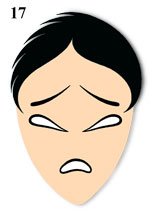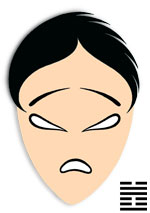

Physiognomy of symbolical emotions.
Hexagram of the canon of changes YiKing 17.


If you are comic clown or dramatic actor of street theatre or circus then
according to hexagrams of the canon of changes and to the shown physiognomic
symbols you can correlate emotional images and mimic movements of your face to
emotions which can be seen in facial expressions of public. Because faces of
street actors and clowns should be coordinated with emotions of outdoor
audience.
In particular it is possible to correlate artistic images of street actors and
clowns to emotions of public according to logic formulas in commenting texts of
this gallery, namely according to psychological meanings of emotional
expressions which are shown in faces of outdoor audience during social
relationships or as a result of personal mutual relations of comedians with a
society.
-
Emotions of social relationships.
Eyebrows: individual mind subordinates to public consciousness.
Eyes: personal volition predominates over collective will.
Mouth: private needs subordinate to social requirements.
Public will of society depends on personal volition of a man or woman, but
social requirements and consciousness dominate over individual mind and private needs.
Personal mutual relations.
Eyebrows: you do not realize people and-or companions disagree with you.
Eyes: you wish to see people and-or companions need your presence.
Mouth: you can not speak and-or companions do not listen to you.
Mental attitudes.
Eyebrows: your notion is caused by opinions of people.
Eyes: your point of view determines sights of people.
Mouth: your words are caused by assertions of people.
You aspire to people but companions do not want to understand you and do not wish to communicate with you.
-
Following 18 physiognomic symbol in gallery.
About artistic images and physiognomy for actors of a street theatre or circus, also outdoor
audience and relations of comical characters.